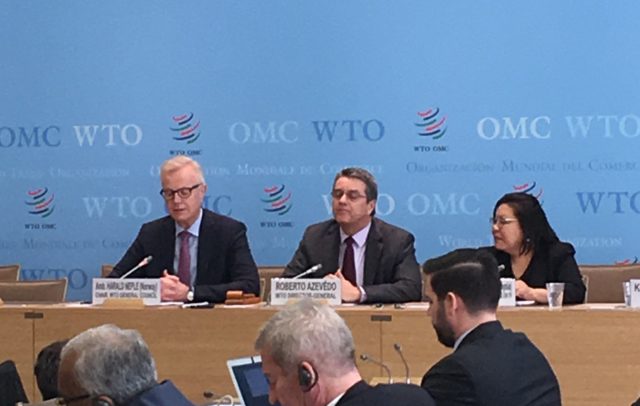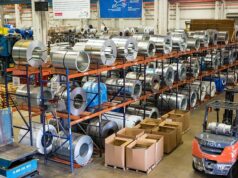The World Trade Organization Trade Facilitation Agreement (TFA) entered into force on Feb 22, with Rwanda, Oman, Chad and Jordan as the latest to ratify the deal.
The entry into force of this agreement, which seeks to expedite the movement, release and clearance of goods across borders, launches a new phase for trade facilitation reforms all over the world and creates a significant boost for commerce and the multilateral trading system as a whole, WTO said in a statement.
It also sets out measures for effective cooperation between customs and other appropriate authorities on trade facilitation and customs compliance issues. It further contains provisions for technical assistance and capacity building in this area.
Rwanda, Oman, Chad and Jordan submitted their instruments of acceptance to WTO Director-General Roberto Azevêdo, bringing the total number of ratifications over the required threshold of 110, or two-thirds acceptance needed from the WTO 164 members.
The TFA is the first multilateral deal concluded in the 21-year history of the WTO to enter into force.
“This is fantastic news for at least two reasons. First, it shows members’ commitment to the multilateral trading system and that they are following through on the promises made in Bali. Second, it means we can now start implementing the Agreement, helping to cut trade costs around the world. It also means we can kick start technical assistance work to help poorer countries with implementation,” said Azevêdo.
“This would boost global trade by up to 1 trillion dollars each year, with the biggest gains being felt in the poorest countries. The impact will be bigger than the elimination of all existing tariffs around the world.
“But this is not the end of the road. The real work is just beginning. This is the biggest reform of global trade in a generation. It can make a big difference for growth and development around the world. Now, working together, we have the responsibility to implement the Agreement to make those benefits a reality.”
Full implementation of the TFA is forecast to slash members’ trade costs by an average of 14.3 per cent, with developing countries having the most to gain, according to a 2015 study carried out by WTO economists. The TFA is also likely to reduce the time needed to import goods by over a day and a half and to export goods by almost two days, representing a reduction of 47 per cent and 91 per cent, respectively, over the current average.
Implementing the TFA is likewise expected to help new firms export for the first time. Moreover, once the TFA is fully implemented, developing countries are predicted to increase the number of new products exported by as much as 20 per cent, with least developed countries (LDCs) likely to see an increase of up to 35 per cent, according to the WTO study.
The Agreement is unique in that it allows developing and least-developed countries to set their own timetables for implementing the TFA depending on their capacities to do so. A Trade Facilitation Agreement Facility (TFAF) was created at the request of developing and least-developed countries to help ensure they receive the assistance needed to reap the full benefits of the TFA and to support the ultimate goal of full implementation of the new agreement by all members. Further information on TFAF is available at www.TFAFacility.org.
Developed countries have committed to immediately implement the Agreement, which sets out a broad series of trade facilitation reforms. Spread out over 12 articles, the TFA prescribes many measures to improve transparency and predictability of trading across borders and to create a less discriminatory business environment. The TFA’s provisions include improvements to the availability and publication of information about cross-border procedures and practices, improved appeal rights for traders, reduced fees and formalities connected with the import/export of goods, faster clearance procedures and enhanced conditions for freedom of transit for goods. The Agreement also contains measures for effective cooperation between customs and other authorities on trade facilitation and customs compliance issues.
Developing countries, in comparison, will immediately apply only the TFA provisions they have designated as “Category A” commitments. For the other provisions of the Agreement, they must indicate when these will be implemented and what capacity building support is needed to help them implement these provisions, known as Category B and C commitments. These can be implemented at a later date with least-developed countries given more time to notify these commitments. So far, notifications of Category A commitments have already been provided by 90 WTO members.
As of today, the following WTO members have accepted the TFA: Hong Kong China, Singapore, the United States, Mauritius, Malaysia, Japan, Australia, Botswana, Trinidad and Tobago, the Republic of Korea, Nicaragua, Niger, Belize, Switzerland, Chinese Taipei, China, Liechtenstein, Lao PDR, New Zealand, Togo, Thailand, the European Union (on behalf of its 28 member states), the former Yugoslav Republic of Macedonia, Pakistan, Panama, Guyana, Côte d’Ivoire, Grenada, Saint Lucia, Kenya, Myanmar, Norway, Viet Nam, Brunei Darussalam, Ukraine, Zambia, Lesotho, Georgia, Seychelles, Jamaica, Mali, Cambodia, Paraguay, Turkey, Brazil, Macao China, the United Arab Emirates, Samoa, India, the Russian Federation, Montenegro, Albania, Kazakhstan, Sri Lanka, St. Kitts and Nevis, Madagascar, the Republic of Moldova, El Salvador, Honduras, Mexico, Peru, Saudi Arabia, Afghanistan, Senegal, Uruguay, Bahrain, Bangladesh, the Philippines, Iceland, Chile, Swaziland, Dominica, Mongolia, Gabon, the Kyrgyz Republic, Canada, Ghana, Mozambique, Saint Vincent & the Grenadines, Nigeria, Nepal, Rwanda, Oman, Chad and Jordan.
The acceptance process involves WTO members ratifying a Protocol of Amendment to insert the TFA into Annex 1A of the WTO Agreement. Members who have not done this are still required to do so.
More information on the WTO and trade facilitation is available at www.wto.org/tradefacilitation.
Important milestone
The World Customs Organization (WCO) said the TFA entering into force is an “important milestone for the international trade and Customs community”.
The organization said it will “continue to seek improvements throughout the global supply chain to obtain the highest levels of safety, security and integrity, which will enhance trade facilitation for compliant actors. This will ultimately have a positive effect on the relationship between all border agencies and the private sector.”
The focus, WCO noted, will shift from the ratification process to the crucial implementation process. The TFA includes extensive ‘special and differential treatment’ (S&D) provisions that will allow developing countries to tailor the scope and timing of implementation to their particular circumstances.
“The WCO has been, and will continue to be, fully committed to making the TFA a success in practical terms,” said WCO Secretary General Dr Kunio Mikuriya. “We will do this by helping our Member Customs administrations who have asked for support in implementing the Agreement’s trade facilitation measures, which will improve economic competitiveness, contribute to economic growth and alleviate poverty.”
In its efforts to assist WCO Members in implementing the TFA and ensure that they fully benefit from the trade facilitation promise the Agreement holds, the WCO launched the Mercator Programme, which brings together all relevant WCO instruments and tools such as the Revised Kyoto Convention on the simplification and harmonization of Customs procedures, globally acknowledged as an excellent TFA implementation instrument.
After the TFA was concluded in Bali, Indonesia, in 2013, the WCO established the Trade Facilitation Agreement Working Group (TFAWG) as a forum to discuss the harmonized implementation of the Agreement, to share national experiences, and to enhance the Members’ capabilities in facilitating international trade.
The TFAWG will next meet on 6 and 7 March 2017 and the timing could not be better, coming so close after the entry into force of the Agreement. On the second day, the TFAWG and the WCO Capacity Building Committee will meet in a joint session to discuss the delivery of technical assistance for TFA implementation.
All TFAWG Members, which include Customs administrations and other border agencies, as well as observers, private sector representatives and other relevant stakeholders, are invited to attend the meeting as it will be an ideal opportunity to discuss this new phase in global trade facilitation.
UNCTAD statement
“We welcome the entry into force of the Trade Facilitation Agreement as a huge step forward in making trade around the world cheaper, easier and faster,” UNCTAD Deputy Secretary General Joakim Reiter said in a statement.
Help for developing countries to do this, provided by UNCTAD and others, is among the provisions of the deal. The Automated System for Customs Data (ASYCUDA) that helped Rwanda to cut down on waiting times was, for example, supplied by UNCTAD.
“New technologies and institutional reforms can improve governance, reduce entry barriers and pull the informal sector into the formal sector. And with less paperwork to dodge, and fewer palms to grease, public revenues go up. This generates new resources for spending on essential services,” Reiter said.
“We work with developing countries to identify compliance gaps and design projects aimed at closing those gaps,” Shamika Sirimanne, Director of the Technology and Logistics Division of UNCTAD, added. “We offer advisory services for countries that face specific legal or technical barriers in complying with the agreement. And we help to establish and maintain national trade facilitation committees that bring public and private sector to work together.” – WTO, WCO and UNCTAD









